Salt hacks for home problems – who knew such a simple, everyday ingredient could be your secret weapon against household woes? I’m constantly amazed by the versatility of common items, and salt is definitely a superstar in that category. For centuries, salt has been more than just a seasoning; it’s been used for preservation, cleaning, and even in traditional remedies. Think about it – ancient civilizations relied on salt to preserve food, enabling them to survive and thrive.
But beyond its historical significance, salt offers a treasure trove of practical solutions for modern-day home challenges. Are you tired of stubborn stains, pesky pests, or dull-looking surfaces? You’re not alone! Many of us spend countless hours and dollars on expensive cleaning products, often with disappointing results. That’s where these amazing salt hacks for home problems come in. I’m going to share some easy, affordable, and surprisingly effective ways to use salt to tackle everything from cleaning your kitchen sink to keeping ants out of your pantry. Get ready to ditch the harsh chemicals and embrace the power of this natural wonder – your home (and your wallet) will thank you!
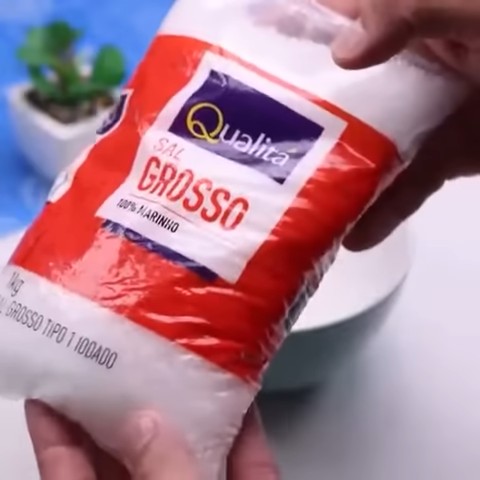
Unlocking the Power of Salt: DIY Hacks for a Sparkling Home
Hey there, fellow DIY enthusiasts! I’m always on the lookout for simple, effective, and budget-friendly solutions to everyday household problems. And guess what? One of the most underrated ingredients sitting right in your pantry is salt! Yes, that humble little box of sodium chloride is a powerhouse of cleaning, deodorizing, and even pest-controlling potential. So, ditch those expensive chemical cleaners and let’s dive into some amazing salt hacks that will transform your home.
Cleaning and Deodorizing with Salt
Salt’s abrasive texture and chemical properties make it a fantastic natural cleaner and deodorizer. It’s perfect for tackling stubborn stains, absorbing odors, and even polishing surfaces.
Cleaning a Scorched Iron
Is your iron looking a little worse for wear with those burnt-on marks? Don’t worry, salt can help!
What you’ll need:
* Salt (table salt works perfectly)
* A clean cotton cloth or towel
* Your iron
Instructions:
1. Prepare the surface: Lay your clean cotton cloth or towel flat on your ironing board. Make sure it’s smooth and wrinkle-free.
2. Sprinkle the salt: Generously sprinkle a layer of salt onto the cloth. You want a good, even coating.
3. Heat up the iron: Set your iron to a dry setting (no steam) and a medium heat.
4. Iron the salt: Gently run the heated iron over the salt-covered cloth in a circular motion. Apply light pressure. You’ll start to see the burnt residue transferring from the iron to the salt.
5. Repeat if necessary: If the iron is heavily scorched, repeat the process until the soleplate is clean.
6. Wipe clean: Once you’re satisfied with the cleaning, unplug the iron and let it cool completely. Then, wipe the soleplate with a clean, damp cloth to remove any remaining salt residue.
Freshening Up Your Sink Drain
A smelly sink drain is a common problem, but salt can help neutralize those unpleasant odors.
What you’ll need:
* 1/2 cup salt
* Hot water
Instructions:
1. Pour in the salt: Pour the 1/2 cup of salt directly down the drain.
2. Flush with hot water: Immediately follow the salt with a generous amount of hot water. Let the hot water run for a minute or two.
3. Repeat regularly: For best results, repeat this process once a week to keep your drain fresh and odor-free. The salt helps to break down grease and grime that can cause those nasty smells.
Cleaning a Greasy Pan
Burnt-on grease can be a nightmare to clean, but salt can make the job much easier.
What you’ll need:
* Salt (coarse salt works best, but table salt is fine too)
* Hot water
* A non-abrasive sponge or scrub brush
Instructions:
1. Sprinkle with salt: While the pan is still warm (but not hot enough to burn you!), sprinkle a generous amount of salt over the greasy surface.
2. Add hot water: Add just enough hot water to create a paste with the salt.
3. Scrub gently: Use a non-abrasive sponge or scrub brush to gently scrub the greasy areas. The salt will act as a mild abrasive, helping to lift the grease.
4. Rinse and wash: Rinse the pan with hot water and wash it as usual with soap and water.
Removing Water Rings from Wood Furniture
Those pesky water rings on your wooden furniture can be embarrassing, but salt can often remove them.
What you’ll need:
* Salt
* A few drops of water
* A soft cloth
Instructions:
1. Make a paste: Mix a small amount of salt with a few drops of water to create a thick paste.
2. Apply to the ring: Gently apply the paste to the water ring.
3. Rub gently: Rub the paste into the ring in a circular motion using a soft cloth. Be very gentle to avoid scratching the wood.
4. Wipe clean: Wipe away the paste with a clean, damp cloth.
5. Dry thoroughly: Dry the area thoroughly with a clean, dry cloth.
Important Note: Always test this method on an inconspicuous area of your furniture first to ensure it doesn’t damage the finish.
Cleaning Brass and Copper
Salt can help restore the shine to your tarnished brass and copper items.
What you’ll need:
* Salt
* White vinegar or lemon juice
* A soft cloth
Instructions:
1. Make a paste: Mix equal parts salt and white vinegar (or lemon juice) to create a paste.
2. Apply to the metal: Apply the paste to the
Hey there, fellow DIY enthusiasts! I’m always on the lookout for simple, effective, and budget-friendly solutions to everyday household problems. And guess what? One of the most underrated ingredients sitting right in your pantry is salt! Yes, that humble little box of sodium chloride is a powerhouse of cleaning, deodorizing, and even pest-controlling potential. So, ditch those expensive chemical cleaners and let’s dive into some amazing salt hacks that will transform your home.
Cleaning and Deodorizing with Salt
Salt’s abrasive texture and chemical properties make it a fantastic natural cleaner and deodorizer. It’s perfect for tackling stubborn stains, absorbing odors, and even polishing surfaces.
Cleaning a Scorched Iron
Is your iron looking a little worse for wear with those burnt-on marks? Don’t worry, salt can help!
What you’ll need:
* Salt (table salt works perfectly)
* A clean cotton cloth or towel
* Your iron
Instructions:
1. Prepare the surface: Lay your clean cotton cloth or towel flat on your ironing board. Make sure it’s smooth and wrinkle-free.
2. Sprinkle the salt: Generously sprinkle a layer of salt onto the cloth. You want a good, even coating.
3. Heat up the iron: Set your iron to a dry setting (no steam) and a medium heat.
4. Iron the salt: Gently run the heated iron over the salt-covered cloth in a circular motion. Apply light pressure. You’ll start to see the burnt residue transferring from the iron to the salt.
5. Repeat if necessary: If the iron is heavily scorched, repeat the process until the soleplate is clean.
6. Wipe clean: Once you’re satisfied with the cleaning, unplug the iron and let it cool completely. Then, wipe the soleplate with a clean, damp cloth to remove any remaining salt residue.
Freshening Up Your Sink Drain
A smelly sink drain is a common problem, but salt can help neutralize those unpleasant odors.
What you’ll need:
* 1/2 cup salt
* Hot water
Instructions:
1. Pour in the salt: Pour the 1/2 cup of salt directly down the drain.
2. Flush with hot water: Immediately follow the salt with a generous amount of hot water. Let the hot water run for a minute or two.
3. Repeat regularly: For best results, repeat this process once a week to keep your drain fresh and odor-free. The salt helps to break down grease and grime that can cause those nasty smells.
Cleaning a Greasy Pan
Burnt-on grease can be a nightmare to clean, but salt can make the job much easier.
What you’ll need:
* Salt (coarse salt works best, but table salt is fine too)
* Hot water
* A non-abrasive sponge or scrub brush
Instructions:
1. Sprinkle with salt: While the pan is still warm (but not hot enough to burn you!), sprinkle a generous amount of salt over the greasy surface.
2. Add hot water: Add just enough hot water to create a paste with the salt.
3. Scrub gently: Use a non-abrasive sponge or scrub brush to gently scrub the greasy areas. The salt will act as a mild abrasive, helping to lift the grease.
4. Rinse and wash: Rinse the pan with hot water and wash it as usual with soap and water.
Removing Water Rings from Wood Furniture
Those pesky water rings on your wooden furniture can be embarrassing, but salt can often remove them.
What you’ll need:
* Salt
* A few drops of water
* A soft cloth
Instructions:
1. Make a paste: Mix a small amount of salt with a few drops of water to create a thick paste.
2. Apply to the ring: Gently apply the paste to the water ring.
3. Rub gently: Rub the paste into the ring in a circular motion using a soft cloth. Be very gentle to avoid scratching the wood.
4. Wipe clean: Wipe away the paste with a clean, damp cloth.
5. Dry thoroughly: Dry the area thoroughly with a clean, dry cloth.
Important Note: Always test this method on an inconspicuous area of your furniture first to ensure it doesn’t damage the finish.
Cleaning Brass and Copper
Salt can help restore the shine to your tarnished brass and copper items.
What you’ll need:
* Salt
* White vinegar or lemon juice
* A soft cloth
Instructions:
1. Make a paste: Mix equal parts salt and white vinegar (or lemon juice) to create a paste.
2. Apply to the metal: Apply the paste to the tarnished brass or copper.
3. Rub gently: Rub the paste into the metal using a soft cloth.
4. Rinse and dry: Rinse the metal thoroughly with water and dry it with a clean cloth.
Pest Control with Salt
Believe it or not, salt can also be used to deter certain pests from your home and garden.
Killing Weeds
Salt is a natural herbicide that can effectively kill weeds.
What you’ll need:
* Salt
* Water
* A spray bottle
Instructions:
1. Make a salt solution: Mix 1 cup of salt with 2 cups of hot water in a spray bottle. Shake well until the salt is dissolved.
2. Spray the weeds: Carefully spray the salt solution directly onto the weeds you want to kill. Avoid spraying it on desirable plants, as it can harm them.
3. Repeat as needed: Repeat the application as needed until the weeds are dead.
Important Note: Be cautious when using salt as a weed killer, as it can also harm the soil and prevent other plants from growing in the treated area. Use it sparingly and only on weeds that are growing in areas where you don’t want anything else to grow.
Ant Deterrent
Salt can disrupt ant trails and deter them from entering your home.
What you’ll need:
* Salt
Instructions:
1. Identify ant entry points: Locate where the ants are entering your home.
2. Create a barrier: Sprinkle a line of salt along the ant trails or at the entry points.
3. Repeat as needed: Repeat the application as needed to maintain the barrier.
Slug and Snail Control
Salt can dehydrate slugs and snails, making it an effective way to control them in your garden.
What you’ll need:
* Salt
Instructions:
1. Sprinkle around plants: Sprinkle a small amount of salt around the base of plants that are being targeted by slugs and snails.
2. Be careful: Be careful not to get salt directly on the plants, as it can damage them.
3. Use sparingly: Use salt sparingly, as it can also harm the soil.
Other Clever Salt Hacks
Beyond cleaning and pest control, salt has a few other surprising uses around the house.
Preventing Ice Buildup
Sprinkling salt on your sidewalks and driveways can help prevent ice buildup during the winter months.
What you’ll need:
* Salt
Instructions:
1. Apply before a freeze: Apply salt to your sidewalks and driveways before a freeze to prevent ice from forming.
2. Reapply as needed: Reapply salt as needed to keep the surfaces clear of ice.
Testing Egg Freshness
Want to know if your eggs are still fresh? Salt can help!
What you’ll need:
* Salt
* Water
* A bowl
Instructions:
1. Prepare a salt solution: Fill a bowl with water and add 2 tablespoons of salt.
2. Place the egg in the solution: Gently place the egg in the salt solution.
3. Observe the egg: If the egg sinks and lies flat on the bottom, it’s fresh. If it sinks but stands on one end, it’s still good but should be used soon. If it floats, it’s no longer fresh and should be discarded.
Extinguishing Grease Fires
Salt can help smother a small grease fire in a pan.
What you’ll need:
* Salt
Instructions:
1. Smother the flames: Carefully pour a generous amount of salt onto the flames to smother them.
2. Do not use water: Never use water on a grease fire, as it can cause the fire to spread.
Important Note
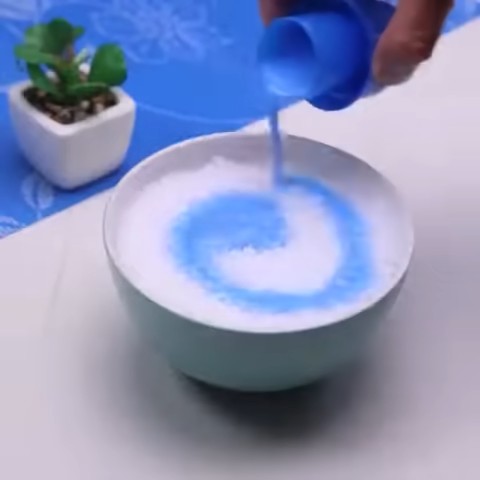
Conclusion
So, there you have it – a treasure trove of salt hacks that can transform your home maintenance routine! From banishing stubborn stains to revitalizing your cleaning arsenal, the humble grain of salt proves to be a surprisingly versatile and effective solution. We’ve explored how salt can tackle everything from greasy pans and clogged drains to pesky ant invasions and dull copper surfaces. The beauty of these DIY tricks lies not only in their simplicity and affordability but also in their eco-friendliness. By opting for salt-based solutions, you’re reducing your reliance on harsh chemicals and contributing to a healthier home environment.
But why is this a must-try? Because these salt hacks are more than just quick fixes; they’re about empowering you to take control of your home’s upkeep with readily available, natural ingredients. Imagine the satisfaction of effortlessly removing a wine stain from your favorite rug or restoring the shine to your tarnished silverware, all with the help of something you likely already have in your pantry. The cost savings alone are significant, especially when compared to expensive commercial cleaning products.
Looking for variations? Consider infusing your salt solutions with essential oils for added fragrance and antibacterial properties. A few drops of lemon essential oil in your salt and water cleaning paste can brighten surfaces and leave a refreshing scent. For tougher stains, try combining salt with baking soda for an extra boost of cleaning power. Experiment with different ratios and combinations to find what works best for your specific needs. You can even create a salt scrub for your hands after gardening or other messy tasks – simply mix salt with olive oil or coconut oil for a gentle exfoliant.
We wholeheartedly encourage you to try these salt hacks and discover the magic for yourself. Don’t be afraid to experiment and adapt the techniques to suit your unique circumstances. The possibilities are endless, and the results are often astonishing.
More importantly, we want to hear about your experiences! Share your successes, your challenges, and any variations you discover in the comments below. Let’s build a community of resourceful homeowners who are passionate about finding simple, effective, and sustainable solutions for everyday problems. Did you find a particularly effective salt hack for a specific cleaning challenge? Did you discover a new way to use salt around the house? We’re eager to learn from your insights and experiences. Together, we can unlock the full potential of this amazing natural resource and transform the way we care for our homes. So go ahead, embrace the power of salt, and let us know what you think!
Frequently Asked Questions (FAQs)
Q: Is salt really effective for cleaning?
A: Absolutely! Salt’s abrasive texture and chemical properties make it a surprisingly effective cleaning agent. It can scrub away grime, absorb spills, and even disinfect surfaces. Salt acts as a mild abrasive, helping to loosen dirt and debris without scratching most surfaces. Its hygroscopic nature allows it to absorb moisture, making it ideal for tackling spills and preventing mold growth. Furthermore, salt has some antibacterial properties, making it a useful addition to your cleaning routine. However, it’s important to test salt solutions on a small, inconspicuous area first to ensure they don’t damage the surface.
Q: What types of salt are best for these hacks?
A: For most cleaning purposes, common table salt or sea salt will work just fine. Coarse salt, like kosher salt or rock salt, can be more effective for scrubbing tougher stains or unclogging drains due to its larger particle size. However, be mindful of using coarse salt on delicate surfaces, as it may cause scratches. Epsom salt, while technically a salt, is magnesium sulfate and is better suited for uses like soothing sore muscles or exfoliating skin. So, while Epsom salt has its own set of benefits, stick to regular table salt, sea salt, or kosher salt for the cleaning hacks mentioned in this article.
Q: Can salt damage certain surfaces?
A: Yes, it’s important to exercise caution when using salt on certain surfaces. Avoid using salt on delicate materials like polished wood, marble, or certain types of fabrics, as it can cause scratches or discoloration. Always test a small, inconspicuous area first to ensure the salt solution doesn’t damage the surface. For example, while salt is great for cleaning copper, it should be used sparingly and followed by a thorough rinse to prevent corrosion. Similarly, avoid using salt on surfaces that are prone to rust, as it can accelerate the rusting process.
Q: How do I unclog a drain with salt?
A: Unclogging a drain with salt is a simple and effective method. First, pour about half a cup of salt down the drain, followed by a kettle of boiling water. The salt acts as an abrasive, helping to dislodge grease and debris, while the boiling water helps to flush it away. Let the mixture sit for about 20-30 minutes before flushing the drain with hot water. For stubborn clogs, you can add baking soda to the salt for an extra boost of cleaning power. Repeat the process if necessary. If the clog persists, it’s best to consult a professional plumber.
Q: Can I use salt to get rid of ants?
A: Yes, salt can be an effective natural ant repellent. Sprinkle salt around areas where you’ve seen ants, such as doorways, windowsills, and cracks in the foundation. The salt disrupts the ants’ scent trails, making it difficult for them to navigate and find food. You can also create a salt solution by mixing equal parts salt and water and spraying it directly on ants or their nests. While salt is a deterrent, it may not completely eliminate an ant infestation. For severe infestations, you may need to consider other pest control methods.
Q: How can I remove stains with salt?
A: Salt is a surprisingly effective stain remover, especially for fresh spills. For wine stains, immediately pour salt generously over the stain to absorb the liquid. Let it sit for several hours or overnight, then vacuum up the salt. For grease stains, make a paste of salt and water and apply it to the stain. Let it dry completely, then brush it off. For rust stains, mix salt with lemon juice to form a paste and apply it to the stain. Let it sit for about 30 minutes, then scrub and rinse thoroughly. Remember to test the salt solution on a small, inconspicuous area first to ensure it doesn’t damage the fabric or surface.
Q: Are there any safety precautions I should take when using salt for cleaning?
A: While salt is generally safe, it’s always a good idea to take a few precautions. Avoid getting salt in your eyes, as it can cause irritation. Wear gloves when handling salt solutions for extended periods, as it can dry out your skin. Keep salt and salt solutions out of reach of children and pets. When using salt to unclog drains, be careful when pouring boiling water, as it can cause burns. Always rinse surfaces thoroughly after cleaning with salt to remove any residue. And as mentioned before, always test salt solutions on a small, inconspicuous area first to ensure they don’t damage the surface.
Q: Can I use salt to clean my cast iron skillet?
A: Yes, salt is a great way to clean your cast iron skillet without damaging the seasoning. After cooking, while the skillet is still warm, pour in a generous amount of coarse salt and use a dry cloth or paper towel to scrub away any food residue. The salt acts as a mild abrasive, helping to loosen the debris without removing the seasoning. Rinse the skillet with hot water and dry it thoroughly. You can then apply a thin layer of oil to maintain the seasoning. Avoid using soap or harsh detergents on your cast iron skillet, as they can strip away the seasoning.
Q: How do I clean tarnished copper with salt?
A: Cleaning tarnished copper with salt is a simple and effective way to restore its shine. Mix equal parts salt, flour, and white vinegar to form a paste. Apply the paste to the tarnished copper and let it sit for about 15-30 minutes. Then, scrub the copper with a soft cloth or sponge and rinse thoroughly with warm water. Dry the copper with a clean cloth. The salt acts as an abrasive, while the vinegar helps to dissolve the tarnish. This method is safe for most copper items, but it’s always a good idea to test a small, inconspicuous area first.


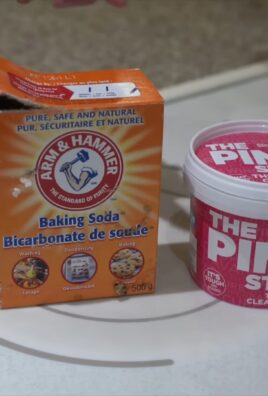
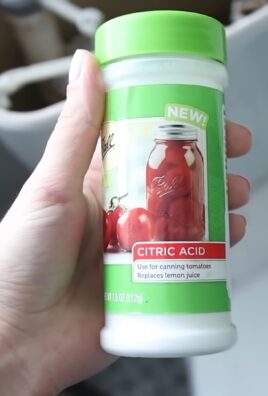
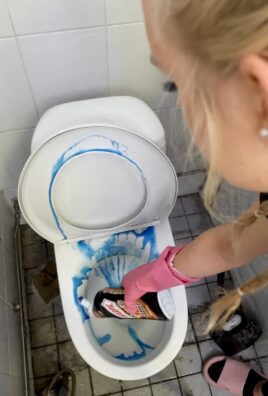
Leave a Comment